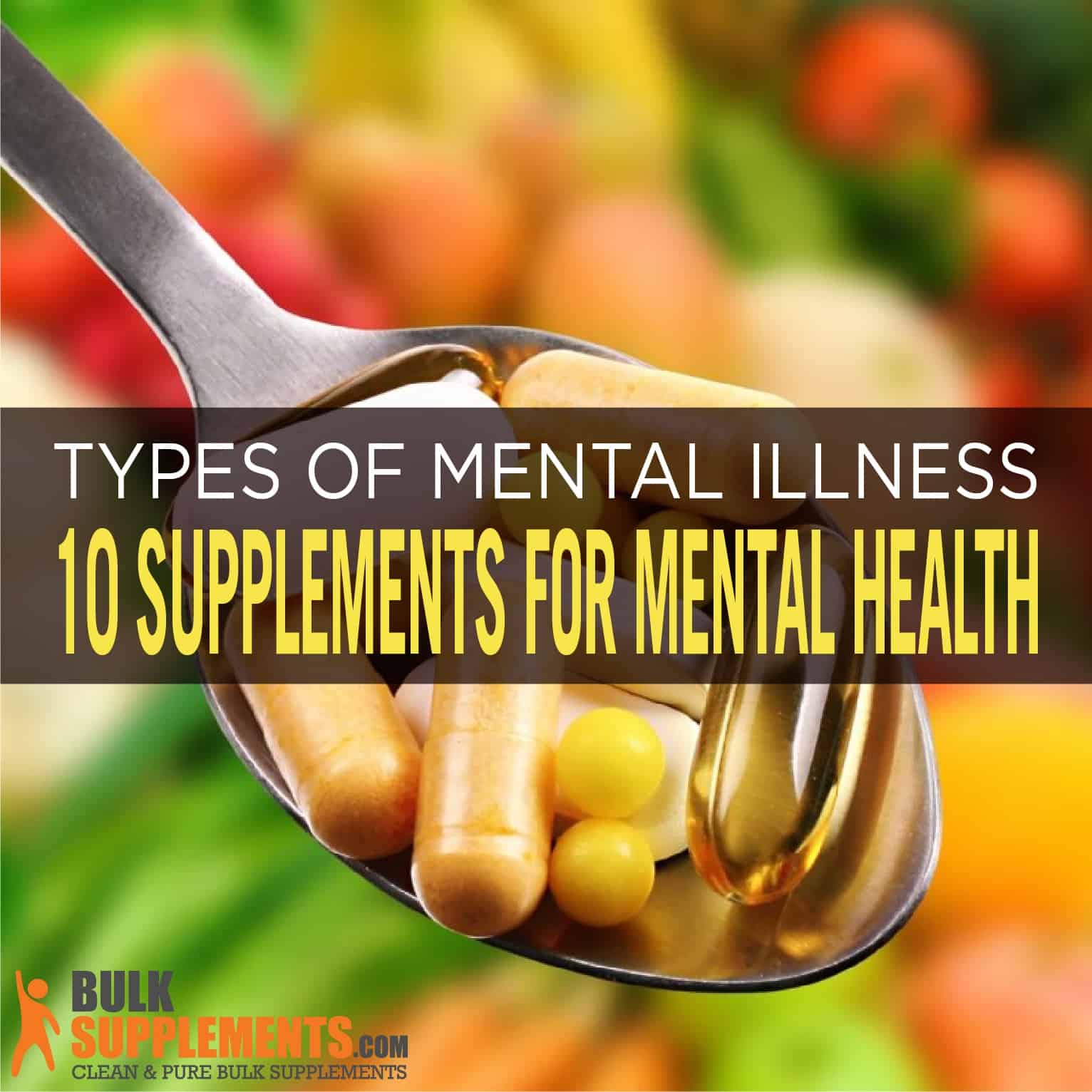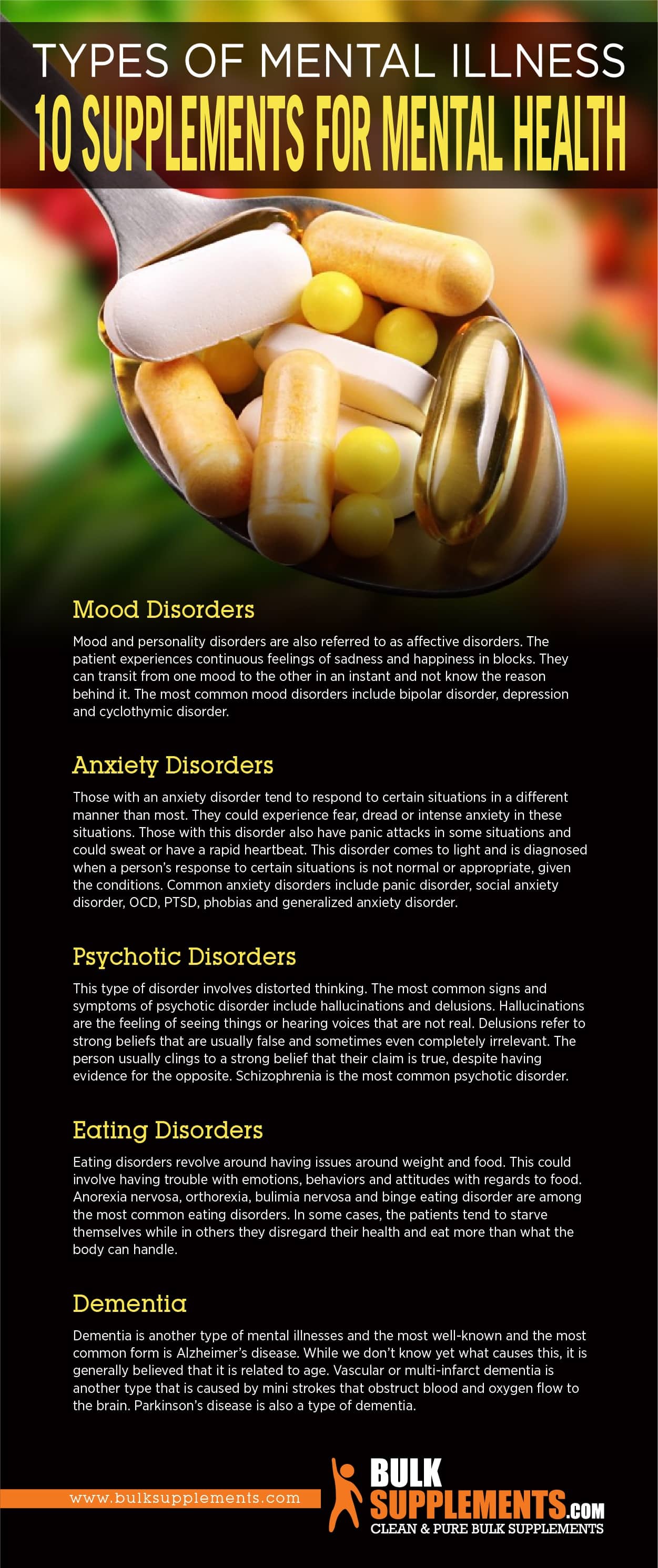10 Supplements for Mental Health
by James Denlinger Digital Marketing Strategist
What is Mental Illness?
Mental illnesses are not uncommon. One in five adults in the U.S. is suffering from one or more forms of mental illnesses. In fact, 8.5 percent of the population has a diagnosable substance use disorder while one in 24 have a serious mental illness. However, mental illnesses can be treated, and patients can start enjoying their life as usual.
In many cases, experts believe that low levels of serotonin can be the reason for behavioral and emotional disorders. Low levels of this hormone is known to cause anxiety, depression, OCD and suicidal behavior. Mental illnesses don’t usually have visible symptoms, but the person may be suffering quietly. First signs can include depression, not functioning normally and mood swings. Sometimes, mental illnesses can also be related to other health issues. This is why doctors usually advise a full medical exam to diagnose and determine the root case.
Unfortunately, even today, there exists a stigma around mental illnesses. This stands in the way of people getting the help and treatment they need. Having a supportive and understanding community is what we need to help those with mental illnesses. Some mental illnesses could be relatively mild and rarely interrupt your regular life. Some others could be so severe that special care and even hospitalizations may be required.
Treatment for mental health is usually personalized based on the patient’s history, their mental health and other factors. This plan is usually developed by the doctor in collaboration with the patient in the presence of a family member or friend. Generally, the most effective way to cure this would be to adhere to a combination of therapy and medication. In recent years, mental health research has come further than ever before.
Types of Mental Illness
Mental illness can affect anyone regardless of their income, social status, age, gender, race, religion, et cetera. There are various different types of mental illnesses to keep in mind.
Mood Disorders
Mood and personality disorders are also referred to as affective disorders. The patient experiences continuous feelings of sadness and happiness in blocks. They can transit from one mood to the other in an instant and not know the reason behind it. The most common mood disorders include bipolar disorder, depression and cyclothymic disorder.
Anxiety Disorders
Those with an anxiety disorder tend to respond to certain situations in a different manner than most. They could experience fear, dread or intense anxiety in these situations. Those with this disorder also have panic attacks in some situations and could sweat or have a rapid heartbeat. This disorder comes to light and is diagnosed when a person’s response to certain situations is not normal or appropriate, given the conditions. Common anxiety disorders include panic disorder, social anxiety disorder, OCD, PTSD, phobias and generalized anxiety disorder.
Psychotic Disorders
This type of disorder involves distorted thinking. The most common signs and symptoms of psychotic disorder include hallucinations and delusions. Hallucinations are the feeling of seeing things or hearing voices that are not real. Delusions refer to strong beliefs that are usually false and sometimes even completely irrelevant. The person usually clings to a strong belief that their claim is true, despite having evidence for the opposite. Schizophrenia is the most common psychotic disorder.
Eating Disorders
Eating disorders revolve around having issues around weight and food. This could involve having trouble with emotions, behaviors and attitudes with regards to food. Anorexia nervosa, orthorexia, bulimia nervosa and binge eating disorder are among the most common eating disorders. In some cases, the patients tend to starve themselves while in others they disregard their health and eat more than what the body can handle.
Dementia
Dementia is another type of mental illnesses and the most well-known and the most common form is Alzheimer’s disease. While we don’t know yet what causes this, it is generally believed that it is related to age. Vascular or multi-infarct dementia is another type that is caused by mini strokes that obstruct blood and oxygen flow to the brain. Parkinson’s disease is also a type of dementia.

Supplements for Mental Health
In addition to healthy eating and consuming supplements, adequate sleep and exercise can help with mental health issues and in recovery. Below are the ten effective supplements for mental health.
- St. John’s Wort
- Vitamin C
- GABA
- Folate or Vitamin B12
- Vitamin D
- Ashwagandha
- Magnesium
- Omega-3
- Ginkgo biloba
- Valerian root
St. John’s Wort
St. John’s wort is an herbal supplement from the plant Hypericum perforatum. It is used mainly for depression. While it is known to help those displaying mild symptoms of depression, it is not helpful in more severe cases. In one 24-hour period, it is advised that an adult can about 1,000 mg. This supplement can decrease the effectiveness of other drugs that the patient may be taking. It is advised that St. John’s wort is not taken with anti-depressants as the combination could cause complications leading to confusion, nausea, vomiting, anxiety and palpitations.
Vitamin C
Vitamin C usually contains antioxidants that helps prevent oxidative damage within our body and to our nervous system. Since oxidative damage could result in increased anxiety, it is better that you have citrus fruits like oranges and lemons. Vitamin C supplements are also pretty effective if taken in correct amounts. An adult may take about 1,000 mg per day.
GABA
GABA or Gamma-aminobutyric acid works to protect against anxiety and depression. Low levels of GABA could lead to depression. Taking supplements with GABA will help treat mental illnesses and conditioned fear. It is naturally available in peas, teas, red wine and many fruits and vegetables.
Folate (Vitamin B12)
Folate and vitamin B12 usually work together and are considered to be the vitamins for fighting stress. For this reason, experts suggest taking the supplements of these vitamins in combination. Folate or folic acid protects against neural tube defects during the pregnancy and is highly advised during pregnancy. It helps regulate sleep and mood. Folate deficiencies could lead to depression.
Lack of vitamin B12 could lead to depression, anemia and fatigue, in addition to other health issues like cardiovascular and neurological disease. While these vitamins are naturally found in meats and eggs, supplements could be a good option for vegans and vegetarians. Vitamin B12 counts among the vitamins that help with anxiety. Since low levels of this vitamin is linked to mental illnesses, B complex for anxiety helps.
Vitamin D
Vitamin D is known for its many health benefits. The most common way of receiving this vitamin is with exposure to sunlight. This helps the body absorb calcium, maintaining the strength and health of our bones. This vitamin also helps protect against high blood pressure, cancer, depression and more.
Vitamin D helps treat the symptoms of depression since low levels of this vitamin is linked to depression. Besides sunlight, you can get vitamin D from milk, sardines, cod liver oil and eggs. Of course, supplements are always a great choice. Since regular exposure to sunlight could increase the risk of skin cancer, sticking to vitamin D rich foods and supplements is a far safer choice. The ideal dose for an adult is 50mg a day.
Ashwagandha
This adaptogen is an Ayurvedic remedy, popularly used in many Asian countries. It is known for its ability to reduce anxiety and help the body release stress. The suggested dosage is about 900 mg per day, taken in the form of capsules, twice a day. Ashwagandha is known to be one of the better supplements for energy and focus.
Magnesium
Taking magnesium supplements before bed will help with muscle relaxation and sleep issues. Since magnesium is responsible for tons of chemical reactions in the human body, it is important to make sure you are not deficient. Combining magnesium and calcium is an effective way of consuming this supplement. Magnesium is also one of the natural mood enhancers commonly prescribed.
Omega-3
Omega-3 fatty acids are usually present in krill oil or fish oil. It is recommended to consume omega-3 supplements that include EPA and DHA so that inflammation will be kept under control. It will also help reduce the risk of heart troubles. Omega-3 is known to help with ADHD, depression, bipolar depression and brain health and work as natural mood stabilizers. One thing to note here is that fish oil can interact with certain medications and behave as blood thinners. Omega-3 supplements work to increase the effectiveness of prescribed antidepressants.
Ginkgo Biloba
Ginkgo biloba is an herbal supplement that is made from the leaves of the ginkgo tree. It is believed that it helps deal with Alzheimer’s disease and antidepressant-related sexual issues. It can slow down cognitive decline for those with Alzheimer’s disease. An adult can take 120 to 240 mg per day. The Ginkgo biloba supplement tends to work slowly and can take quite a long time to show results. It is not recommended for those with vascular dementia.
Valerian Root
The valerian root is retrieved from the root of the Valeriana officinalis, a pink flower. It is known to help with sleep troubles and anxiety. Since it does not cause any memory issues like other medications do, it is ideal for older adults. Children can be given this supplement to improve their sleep and reduce their anxiety. The recommended dosage for an adult is about 450 to 600 mg per day.
The Bottom Line
Mental illness could be defined as a change in a person’s behavior, mood or thinking. There are many types of mental illnesses, each affecting certain aspects of life. The different types include mood disorders, anxiety disorders, psychotic disorders, eating disorders and dementia. While age is a possible factor for the cause of certain disorders, the actual cause or reason has not yet been determined.
Treatment for mental illnesses usually includes a personalized plan for the patient. A combination of therapy and medication generally shows the most effective results. In addition to this, a nutritious diet, proper exercise and intake of supplements is known to help deal with the issues as well.
Sponsor Ads
Created on Feb 28th 2020 16:27. Viewed 335 times.



